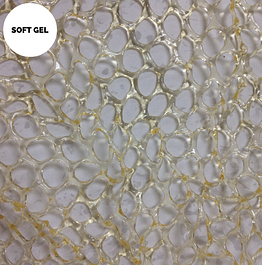We get a lot of questions about our most popular adhesive, gelatin glue.
In this article, we’re going to touch on what gelatin is and why something not being vegan doesn’t necessarily mean it’s automatically bad for the environment.
Is Gelatin Glue Vegan?
No. Gelatin glue isn’t vegan and is sourced from animal proteins.
One of the main components in this glue is, of course, gelatin. Gelatin is derived from its parent protein, collagen, the main structural protein in connective tissues. Collagen is made up of amino acids bound together into the shape of a triple helix and is found in tissues like cartilage, bones, tendons, ligaments, and skin.
Gelatin is produced when collagen is hydrolyzed. This is a chemical process where water is added to a substance to break it down, usually through the application of heat. The technique of turning animal products into adhesives has happened since ancient times. Stone carvings discovered in Thebes depict animal glue preparation and how it was used to build wooden furniture for the pharaohs.
Where is Gelatin Glue Sourced From?
 Our gelatin glue comes from recycled pharmaceutical and nutritional gel netting. If you’ve ever taken a soft gel pill before, you’ve eaten gelatin.
Our gelatin glue comes from recycled pharmaceutical and nutritional gel netting. If you’ve ever taken a soft gel pill before, you’ve eaten gelatin.
Many pharmaceutical manufacturers use gelatin derived from pig and cow hides to create soft capsules. We take this leftover netting that would otherwise go to a landfill and recycle it into gelatin glue blocks (or cakes).
Is Gelatin Glue Eco-friendly?
Yes. Gelatin glue is made from natural components and is predominantly composed of pharmaceutical-grade gelatin, sugars, Epsom salt, water, and glycerin. It is eco-friendly and was recently certified by BPI for its compostability.
Gelatin glue is compostability because it naturally breaks down without human intervention by bacteria and fungi if favorable conditions are met.
What Else Is Gelatin Used For?
Gelatin can be found in a surprising range of different products. If you read the ingredients of your favorite foods, you might find it in dozens of different desserts, sauces, and staples. Below are a few of the most popular uses:
- Pills - As mentioned above, gelatin is used to make the soft outer casing of capsules.
- Marshmallows - Gelatin helps give most brands of marshmallows their airy, puffy texture.
- Gummy Bears - Many kinds of gummy bears and candies use gelatin to make them chewy.
- Sauces, Soups, and Gravies - These staples often use gelatin as a thickening agent.
- Chewing Gum - Gelatin is frequently an ingredient in many gum brands to give it that signature chew.
Are there Vegan Glues?
Yes. Just like how many foods have more vegan-friendly options, adhesive manufacturers are creating glue alternatives.
Cornstarch, for example, is becoming increasingly popular as an adhesive ingredient. Other sources of natural carbohydrates adhesive manufacturers use include potatoes, wheat, rice, tapioca, and seeds.
We carry starch glues that can be used for packaging applications, like corrugated boxes, cartons, bottle labeling, and envelopes. Depending on your application, a plant-based glue might work. However, they tend to be much less water-soluble than gelatin glue and are not as popular with packaging manufacturers.
Find the Right Adhesive For Your Application
One of the biggest determinators of what glue to use comes down to what you’re trying to stick together. We strive to help our customers find plastic-free alternatives when possible, whether that be gelatin or plant-based. To find the right glue for your manufacturing process, speak with an expert.

.png)

